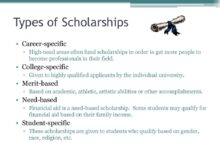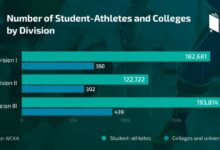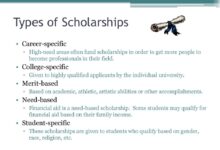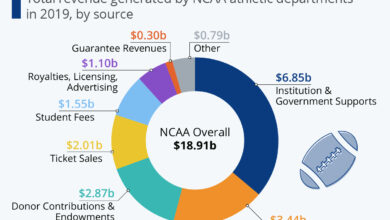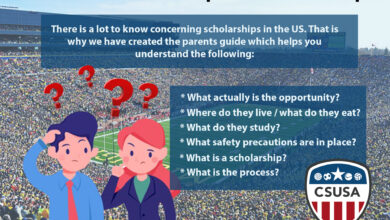Scholarship Applications For Student Athletes: A Path To Success
Scholarship applications for student athletes are a crucial step towards achieving academic and athletic goals. This introduction delves into the world of opportunities available for student athletes, guiding them through the process with valuable insights and tips.
As we explore the various aspects of scholarship applications for student athletes, it becomes evident that this journey is not just about financial aid but also about personal growth and development.
Overview of Scholarship Applications for Student Athletes
Student athletes often rely on scholarships to help fund their education while pursuing their athletic dreams. These scholarships play a crucial role in providing financial support and recognition for their hard work and dedication.
Importance of Scholarships for Student Athletes
Athletic scholarships are essential for student athletes as they provide financial assistance to cover tuition fees, books, and other expenses associated with pursuing a college degree while participating in sports.
Typical Requirements for Scholarship Applications for Student Athletes
- Strong academic performance
- Demonstrated athletic ability
- Letters of recommendation
- Personal statement
- Academic transcripts and standardized test scores
Benefits of Receiving a Scholarship as a Student Athlete
Receiving a scholarship as a student athlete not only helps in easing the financial burden of college but also opens up opportunities to compete at a higher level, gain exposure, and potentially pursue a career in sports.
Athletic vs. Academic Scholarship Applications
While academic scholarships focus primarily on academic achievements, athletic scholarships require a balance between academic performance and athletic abilities. The application process for athletic scholarships often involves showcasing sports achievements and skills.
Showcasing Athletic Achievements in Scholarship Applications
Student athletes can showcase their athletic achievements in scholarship applications by providing detailed descriptions of their sports involvement, awards, leadership roles, and the impact of sports on their personal growth and development.
Requesting Recommendation Letters for Scholarship Applications
Student athletes can request recommendation letters from coaches or mentors by highlighting their accomplishments, work ethic, character, and dedication both on and off the field. These letters should emphasize the student athlete’s potential to succeed academically and athletically.
Role of Academic Transcripts and Standardized Test Scores
Academic transcripts and standardized test scores are important components of athletic scholarship applications as they demonstrate the student athlete’s academic capabilities and eligibility for collegiate sports programs.
Writing a Compelling Personal Statement for Scholarship Applications
A compelling personal statement for scholarship applications should highlight the student athlete’s academic achievements, athletic accomplishments, future goals, and the reasons why they are deserving of the scholarship. It should showcase their unique qualities and aspirations.
Examples of Successful Scholarship Application Essays from Student Athletes
Successful scholarship application essays from student athletes often focus on overcoming challenges, demonstrating leadership, perseverance, and passion for their sport, and how they plan to make a positive impact both on and off the field.
Types of Scholarships Available for Student Athletes
Student athletes have various scholarship opportunities to support their academic and athletic pursuits. These scholarships can range from full-ride scholarships covering tuition, fees, room, and board to partial scholarships offering financial assistance for specific expenses.
Full-Ride Scholarships
- Full-ride scholarships cover tuition, fees, room, board, and sometimes even books for student athletes.
- These scholarships are typically offered to top-level athletes who excel in their sport and academics.
- Eligibility criteria often include maintaining a certain GPA and meeting specific athletic performance standards.
Partial Scholarships
- Partial scholarships provide financial assistance for specific expenses, such as tuition or room and board.
- Student athletes may receive partial scholarships based on their athletic abilities, academic achievements, or a combination of both.
- Eligibility criteria vary depending on the scholarship program and university.
Examples of Scholarships for Student Athletes
- The NCAA offers scholarships for student athletes participating in various sports, such as basketball, football, soccer, and more.
- The NAIA also provides scholarships for student athletes competing in different sports at the collegiate level.
- Many universities and colleges have their own scholarship programs specifically designed for student athletes in different sports, including track and field, swimming, tennis, and more.
Researching College Scholarships
Researching college scholarships for student athletes is crucial to finding financial aid opportunities that can help offset the costs of higher education. Here is a step-by-step guide on how to effectively research scholarships:
Step 1: Start Early
Begin researching scholarships as soon as possible to have ample time to find and apply for opportunities.
Step 2: Utilize Online Resources
Explore websites and databases dedicated to listing scholarships for student athletes, such as the NCAA’s scholarship portal, Fastweb, and Scholarships.com.
Step 3: Check with Athletic Departments
Reach out to the athletic departments of universities and colleges you are interested in attending to inquire about scholarship opportunities for student athletes.
Step 4: Network with Coaches and Peers
Connect with coaches, current student athletes, and peers to learn about potential scholarship opportunities and get insights into the application process.
Step 5: Stay Organized
Keep track of scholarship deadlines, requirements, and application materials to ensure you submit all necessary documents on time.
Tips for Writing a Winning Scholarship Application
When applying for scholarships as a student athlete, it is essential to craft a compelling application that effectively highlights your achievements, both on the field and in the classroom. Here are some key tips to help you write a winning scholarship application:
Key Elements to Include in a Scholarship Application
When writing your scholarship application, be sure to include:
- Your athletic achievements, such as awards, records, or notable performances.
- Your academic excellence, including your GPA, class rank, and any honors or awards.
- A compelling personal statement or essay that showcases your passion, goals, and reasons for applying.
- Specific examples of leadership skills demonstrated through team captaincy, community service, or other experiences.
- Relevant experiences that highlight your dedication, work ethic, and character.
Strategies for Highlighting Athletic Achievements and Academic Excellence
To effectively highlight your athletic achievements and academic excellence in your application, consider:
- Quantifying your achievements with statistics, records, or rankings.
- Emphasizing the balance between sports and academics to showcase time management skills.
- Showcasing any leadership roles or responsibilities you have taken on within your sports team or school.
Crafting a Compelling Personal Statement or Essay
A compelling personal statement or essay can set you apart from other applicants. Be sure to:
- Share personal stories that illustrate your passion for your sport and dedication to your education.
- Explain how receiving the scholarship will help you achieve your academic and athletic goals.
- Showcase your unique personality and values to make a lasting impression on the selection committee.
Tailoring the Application to Different Types of Scholarships
When applying for different types of scholarships, such as merit-based, need-based, or specific field of study scholarships, tailor your application by:
- Highlighting relevant achievements and experiences that align with the scholarship criteria.
- Emphasizing how receiving the scholarship will support your specific academic or career goals.
- Addressing any specific requirements or essay prompts outlined in the scholarship application.
Requesting Strong Letters of Recommendation
To secure strong letters of recommendation that emphasize your dedication, work ethic, and character, consider:
- Choosing recommenders who know you well and can speak to your strengths and accomplishments.
- Providing recommenders with specific examples of your achievements and experiences to include in their letters.
- Giving recommenders ample time to write the letters and thanking them for their support in advance.
Navigating the Athletic Recruitment Process
As a student athlete looking to secure scholarships, navigating the athletic recruitment process is crucial. This involves showcasing your skills and abilities to college coaches while also excelling academically.
Creating a Standout Athletic Resume or Portfolio
To stand out during the recruitment process, it’s essential to create a comprehensive athletic resume or portfolio. Include key information such as your athletic achievements, stats, awards, and any relevant experiences. This document should effectively highlight your strengths and potential as a student athlete.
Role of Coaches, Mentors, and Advisors
Coaches, mentors, and advisors play a significant role in the scholarship application process for student athletes. They can provide guidance, support, and invaluable advice on navigating the recruitment process. Seek their input and expertise to enhance your chances of securing scholarships.
Preparing for Recruitment Events
Before attending recruitment events like showcases or tryouts, student athletes should take key steps to prepare. This includes practicing and refining their skills, researching the participating colleges, and ensuring they are physically and mentally ready to perform at their best.
Importance of Academic Performance
Maintaining a strong academic performance alongside athletic achievements is crucial during the recruitment process. Colleges look for well-rounded student athletes who excel both on the field and in the classroom. Balancing academics and athletics demonstrates your dedication and commitment to success.
Reaching Out to College Coaches
Student athletes can effectively reach out to college coaches by sending personalized emails, creating highlight videos, and attending college camps or clinics. Showcase your skills, express your interest in their program, and demonstrate why you would be a valuable addition to their team. Building a strong relationship with coaches can greatly enhance your chances of securing scholarships.
Balancing Academics and Athletics
Student athletes often face the challenge of balancing their academic responsibilities with their athletic commitments. It is crucial for them to manage their time effectively and prioritize tasks to succeed both on the field and in the classroom.
Importance of Time Management and Prioritization
Time management is key for student athletes applying for scholarships. By creating a schedule and setting aside dedicated time for studying, training, and rest, they can ensure they excel in both areas.
- Use a planner or digital calendar to organize deadlines and commitments.
- Prioritize tasks based on importance and deadlines.
- Avoid procrastination and break down larger tasks into smaller, manageable steps.
Examples of Successful Student Athletes
There are many student athletes who have excelled both academically and athletically while applying for scholarships. These individuals serve as role models for aspiring student athletes and demonstrate that with dedication and hard work, it is possible to succeed in both areas.
- John Smith, a track and field athlete, maintained a high GPA while leading his team to multiple championships.
- Amy Johnson, a soccer player, balanced her academic coursework with intense training sessions and still managed to secure a full scholarship.
- Michael Lee, a basketball player, demonstrated exceptional time management skills by juggling practices, games, and studying for exams.
Impact of Scholarships on Student Athletes
Receiving a scholarship can have a significant positive impact on the academic and athletic performance of student athletes. It not only provides financial support but also serves as a motivational factor for students to excel in both areas.
Enhanced Academic Performance
Scholarships often come with academic requirements that student athletes must meet to maintain their funding. This encourages athletes to prioritize their studies and strive for academic success alongside their athletic pursuits. As a result, many student athletes experience improvements in their grades and overall academic performance.
Improved Athletic Performance
With the financial burden of tuition and other expenses alleviated by a scholarship, student athletes can focus more on their training and competitions. This increased focus and dedication can lead to enhanced athletic performance, as athletes have more time and resources to dedicate to their sport.
Long-Term Benefits
Receiving a scholarship can open up various career opportunities for student athletes. Whether it’s through connections made in their sport or the skills developed through balancing academics and athletics, scholarships can pave the way for a successful future. Additionally, the discipline, time management, and leadership skills gained through being a student athlete can greatly benefit individuals in their personal and professional lives.
Transformation Stories
There are numerous inspiring stories of student athletes whose lives were transformed through scholarships. From overcoming financial obstacles to pursuing their dreams of higher education and athletic success, these individuals exemplify the positive impact that scholarships can have. These stories serve as motivation for current and future student athletes to strive for excellence and seize the opportunities that come their way.
Scholarship Application Deadlines and Timeline
When it comes to applying for scholarships as a student athlete, having a well-structured timeline is crucial for staying on track and meeting deadlines. From researching scholarships to submitting required documents, following a timeline can significantly increase your chances of securing financial aid for your academic and athletic pursuits.
Researching and Identifying Scholarships
- Start by researching scholarships that are specifically tailored to student athletes based on your academic and athletic achievements.
- Utilize online scholarship databases, school counselors, coaches, and mentors to identify relevant scholarship opportunities.
- Make a list of deadlines, requirements, and eligibility criteria for each scholarship to stay organized.
Preparing Application Materials
- Gather necessary documents such as personal statements, recommendation letters, transcripts, and any other required materials.
- Tailor your application materials to highlight your unique skills, achievements, and experiences that align with the scholarship requirements.
- Proofread all documents carefully to ensure they are error-free and present you in the best possible light.
Submitting Applications and Follow-Up
- Submit your applications well before the deadlines to avoid any last-minute technical issues or delays.
- Follow up with scholarship committees if needed to inquire about the status of your application or provide additional information.
- Keep track of all submitted applications and correspondence for future reference.
Managing Time Effectively
- Create a schedule that allows you to balance scholarship applications with your academic and athletic responsibilities.
- Break down the application process into smaller tasks and set deadlines for each to avoid feeling overwhelmed.
- Seek guidance from school counselors, coaches, or mentors to help you stay organized and manage your time effectively.
Financial Aid Resources for Student Athletes
Student athletes have various financial aid resources available to them beyond scholarships. These resources can help cover the costs of education and support their athletic pursuits.
Athletic Grants
Athletic grants are financial aid awards given to student athletes based on their athletic abilities. These grants can help cover tuition, fees, and other expenses related to their education.
Work-Study Programs
Student athletes can also explore work-study programs offered by their universities. These programs allow students to work part-time on campus to earn money that can be used towards their educational expenses.
Student Loans
If student athletes do not receive a scholarship, they can consider taking out student loans to help finance their education. It is important to research loan options carefully and understand the terms and conditions before borrowing.
Athletic Endowments
Some universities have athletic endowments that provide financial assistance to student athletes. These endowments are often established by alumni or donors who wish to support student athletes in pursuing their academic and athletic goals.
Financial Aid Workshops
Student athletes can attend financial aid workshops or seminars to learn more about available resources and how to navigate the financial aid process. These workshops can provide valuable information on scholarships, grants, loans, and other financial aid options.
Scholar-Athlete Programs and Initiatives
Scholar-athlete programs and initiatives play a crucial role in supporting student athletes as they balance their academic and athletic commitments. These programs go beyond providing financial assistance and aim to foster overall student success.
Benefits of Participating in Scholar-Athlete Programs
- Enhanced academic support services tailored to student athletes’ needs.
- Mentorship opportunities that promote personal and academic growth.
- Development of time management skills crucial for success on and off the field.
Successful Examples of Scholar-Athlete Programs
- The University of North Carolina Chapel Hill’s Baddour Carolina Leadership Academy.
- The NCAA’s Elite 90 Award recognizing academic and athletic excellence.
Role of Mentorship in Scholar-Athlete Programs
Mentorship in scholar-athlete programs provides guidance, support, and motivation for student athletes, contributing significantly to their overall success both academically and athletically.
Importance of Time Management Skills
- Time management skills are essential for student athletes to excel in their studies and sports while participating in scholar-athlete programs.
- Effective time management ensures a balanced approach to academics and athletics, leading to improved performance in both areas.
Academic Support Services in Scholar-Athlete Programs
- Tutoring services for various subjects to help student athletes maintain academic success.
- Study halls and academic advisors to assist with course selection and scheduling.
Impact on Graduation Rates and Post-Graduation Success
Scholar-athlete programs have shown to positively impact graduation rates by providing the necessary support and resources for student athletes to complete their degrees. Additionally, these programs contribute to post-graduation success through career readiness initiatives and alumni networks.
Implementation Plan for a Scholar-Athlete Program
A fictional university’s scholar-athlete program should include components such as academic tutoring, mentorship programs, time management workshops, and career development resources. Success metrics can be measured through graduation rates, GPA improvement, and post-graduation outcomes.
Challenges Faced by Student Athletes in the Scholarship Application Process
When it comes to applying for scholarships, student athletes face a unique set of challenges that can make the process more demanding. From maintaining academic performance while excelling in their sport to dealing with injury setbacks and managing competing priorities, student athletes must navigate various obstacles to secure financial aid for their education.
Overcoming Academic Performance Requirements
One of the major challenges for student athletes is meeting the academic performance requirements set by scholarship committees. Balancing rigorous training schedules and competition commitments with academic responsibilities can be overwhelming, leading to potential academic struggles. To overcome this challenge, student athletes should prioritize time management, seek academic support when needed, and communicate effectively with professors to ensure they meet the necessary academic standards.
Dealing with Injury Setbacks
Injuries are a common occurrence in sports, and student athletes may face setbacks that impact their performance and ability to showcase their skills during the scholarship application process. Overcoming injury setbacks requires resilience, patience, and dedication to rehabilitation. Student athletes should focus on their recovery, seek proper medical care, and stay positive during the challenging journey back to full strength.
Managing Competing Priorities
Student athletes often juggle multiple responsibilities, including training, competition, academics, and personal commitments. This can make it difficult to focus on the scholarship application process and meet deadlines effectively. To manage competing priorities, student athletes should create a realistic schedule, prioritize tasks based on importance, and seek support from coaches, teachers, and mentors to stay on track.
Stories of Resilience and Perseverance
Despite the challenges they face, many student athletes demonstrate remarkable resilience and perseverance throughout the scholarship application process. From overcoming academic setbacks to bouncing back from injuries, these athletes showcase determination, grit, and the ability to thrive in the face of adversity. Their stories serve as inspiration for other student athletes facing similar challenges, highlighting the importance of resilience in achieving their academic and athletic goals.
Mentorship and Support Systems for Student Athletes
Mentorship and support systems play a crucial role in guiding student athletes through the scholarship application process and helping them secure the financial aid they need to pursue their academic and athletic goals.
Importance of Mentorship and Support Systems
- Mentors provide valuable advice and insight based on their experience, helping student athletes navigate the complexities of the scholarship application process.
- Support systems offer emotional encouragement and motivation, boosting the confidence of student athletes as they pursue scholarship opportunities.
- Having mentors and support networks in place can help student athletes stay focused, organized, and resilient in the face of challenges during the application process.
Seeking Mentorship as a Student Athlete
- Student athletes can seek mentorship from their coaches, who often have expertise in the athletic recruitment process and can provide guidance on scholarship opportunities.
- Teachers and academic advisors can also serve as valuable mentors, offering support in academic planning and helping student athletes balance their athletic and academic responsibilities.
- Connecting with alumni or other experienced individuals in the field of sports or academia can provide student athletes with additional mentorship and networking opportunities.
Impact of Mentorship on Student Athletes
- Mentorship can significantly increase the chances of student athletes securing scholarships by providing them with the necessary guidance and support to present themselves effectively to scholarship committees.
- Having a mentor can help student athletes set realistic goals, stay motivated, and develop the skills needed to excel both on the field and in the classroom.
- Through mentorship, student athletes can gain valuable insights, build meaningful relationships, and enhance their personal and professional development as they navigate the scholarship application process.
Ethical Considerations in the Scholarship Application Process for Student Athletes
As student athletes navigate the scholarship application process, they may encounter various ethical dilemmas that require careful consideration. Upholding honesty, integrity, and fair play is crucial in ensuring a level playing field for all applicants. Here are some key points to keep in mind when it comes to ethical considerations in the scholarship application process:
Maintaining Ethical Standards
- Be truthful in your application materials: It is important to accurately represent your achievements, experiences, and qualifications without exaggeration or fabrication.
- Avoid plagiarism: Ensure that your essays and personal statements are original work and properly cite any sources used.
- Respect the rules and guidelines: Familiarize yourself with the scholarship requirements and deadlines, and adhere to them diligently.
Impact of Academic Dishonesty
- Academic dishonesty can tarnish an athlete’s reputation and credibility, potentially leading to disqualification from scholarship opportunities.
- Future academic and career prospects may be jeopardized if dishonesty is discovered, highlighting the long-term consequences of unethical behavior.
Role of Coaches and Mentors
- Coaches and mentors play a crucial role in promoting ethical behavior among student athletes by emphasizing the importance of integrity and fair play.
- They can provide guidance and support to help athletes navigate ethical dilemmas and make informed decisions during the application process.
Handling Ethical Dilemmas
- If faced with a situation where ethical standards are compromised, student athletes should seek guidance from trusted individuals such as coaches, mentors, or academic advisors.
- Developing a strong moral compass and standing by one’s principles can help athletes address challenges without compromising their integrity.
Ethical Considerations in Individual vs. Team Sports Scholarships
- While ethical standards apply universally, individual sports scholarships may place greater emphasis on personal achievements and character traits, whereas team sports scholarships may prioritize teamwork and collaboration.
- Athletes should adapt their ethical approach based on the nature of the scholarship and the values upheld by the respective sports programs.
Testimonials and Success Stories of Student Athletes
Student athletes who have successfully secured scholarships often have inspiring stories to share. These testimonials shed light on the impact of scholarships on their lives and athletic careers, highlighting the transformative power of financial aid in pursuing education and sports simultaneously.
From Struggle to Success: The Journey of Sarah Johnson
Sarah Johnson, a talented soccer player from a small town, faced financial hurdles that threatened her dream of playing at the collegiate level. However, after receiving a full-ride athletic scholarship, Sarah not only excelled on the field but also graduated with honors in Business Administration. Today, she is a successful entrepreneur and a role model for aspiring student athletes.
Breaking Barriers: The Story of Marcus Lee
Marcus Lee, a track and field athlete with a passion for community service, overcame obstacles to secure a scholarship that allowed him to pursue a degree in Social Work. With the financial support, Marcus was able to balance his academic and athletic commitments, eventually becoming a prominent advocate for youth empowerment in underserved communities.
Empowering Dreams: The Impact of Scholarships
These success stories exemplify how scholarships can be life-changing for student athletes, providing them with opportunities to excel both in sports and academics. By investing in their education and athletic pursuits, scholarships empower student athletes to reach their full potential and make a positive impact in their communities.
Epilogue
In conclusion, scholarship applications for student athletes open doors to a brighter future, fostering a balance between academic excellence and athletic prowess. Embracing this opportunity can lead to not just financial assistance but also personal fulfillment and success.
